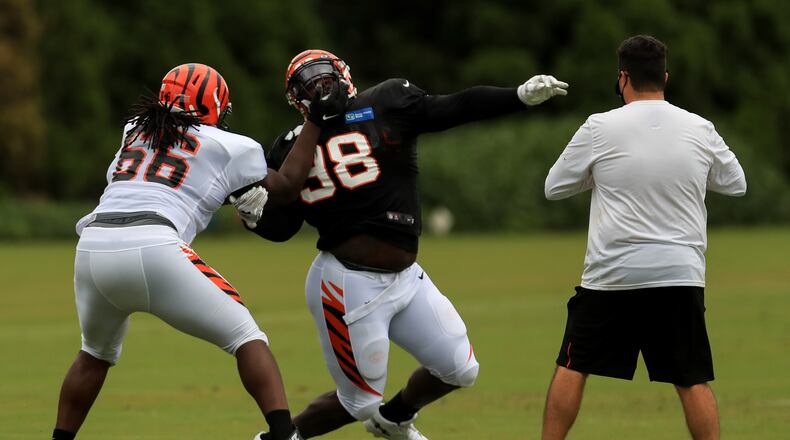According to center Trey Hopkins, the Positive Impact Committee – a team leadership group on which Hopkins serves -- requested a meeting with ownership Thursday, and the players were appreciative of the quick response and the chance to have a meaningful discussion with the higher ups in the organization.
“I thought it was great,” Hopkins said Friday in an online news conference. “I thought it was very encouraging that Mr. Brown took the time to meet with us and the whole family this morning. It was something that a lot of guys, we just wanted to meet with him and talk to him about our ideas, and the fact that ownership would come and listen and be receptive about something that is important to their players I think speaks a lot to how much they truly care about the players and the organization as a whole.”
Hopkins said the meeting was in-person and lasted about an hour with the members of the leadership committee, a couple coaches, including Zac Taylor, and ownership.
Players have spoken often in the past few months with other members of the Brown family, including Executive Vice President Katie Blackburn and Director of Strategy & Engagement Elizabeth Blackburn, but Hopkins said it was even more powerful to have Brown in the room. Brown spoke about some of the history of his father and some of the things he did to integrate Black players into the league after founding the Cleveland Browns and serving as the team’s first coach.
“They have been pioneers in integrating football and not just for players but also bringing coaches in, so it’s great in that aspect, having someone whose father was a part of history in that way to be involved with us here today,” Hopkins said. “Again, it speaks more to his level of care for the organization and the players for him to take the time, very quickly might I add, to come speak with us. This was something we decided we would like to speak to him yesterday, and he made time available very soon, as soon as the next morning. Again, hats off to him and much appreciation and respect.”
Taylor took some time Friday to address with the media some of the discussions that have been going on internally for the last several months and specifically in the last 36 hours. He said he’s had some “really raw, emotional conversations” with the players, as the team wants to make sure all players have a voice and a chance to share their own personal experiences and ideas on how to impact change in their own communities.
The discussions have been “really eye-opening” for Taylor, and he expects to have more of a message to put out Saturday from the voice of the players, ownership, coaches and personnel staff. The team was scheduled to have another meeting Friday afternoon to continue to discuss ideas.
“We wanted to make sure … everyone (could) come to a place of understanding and work to create a unified message that has a very positive impact on the community and on our country,” Taylor said. “And we’ve really, in these last 36 hours, had some really personal conversations with players, coaches, personnel staff and ownership. And I think it’s been really beneficial. We’ve all come to a great place of understanding.”
Hopkins said he’s also had meaningful conversation with friends around the league, and the thing that echoes throughout is how professional athletes are not immune to racial issues in this country, just because they have nice houses and can send their kids to good schools.
“At the end of the day, the majority of us have dark skin,” he said. “We are African American men and our children, as well as ourselves, have to walk around as African American men, so it’s not something we can rest on just because we have a little bit of money and say, ‘Well, that’s not us. Let’s not get into it. Let’s just play football.’ … It’s not something we can ignore … because at the end of the day when I take these shoulder pads off, when I take this helmet off, I’m still a Black man in America. My children will be Black children in America, and our goal as well as the goal of every Black person, I feel like at this point in America, is to make the country our kids grow up in more just, more fair and more safe for children that look like us.”
Hopkins said his fellow NFL players hear all too often that they should “just play football” and not speak out about things that are perceived as political.
“My reaction to those people would be — I don’t think it is a political statement to say that the color of my skin should endanger my life,” Hopkins said. “… When my playing days are over, I cannot lay down the color of my skin. I cannot make myself less of a threat. I’m going to be a large black man. My kids will probably be large and black. So it is not something I can walk away from.”
About the Author
